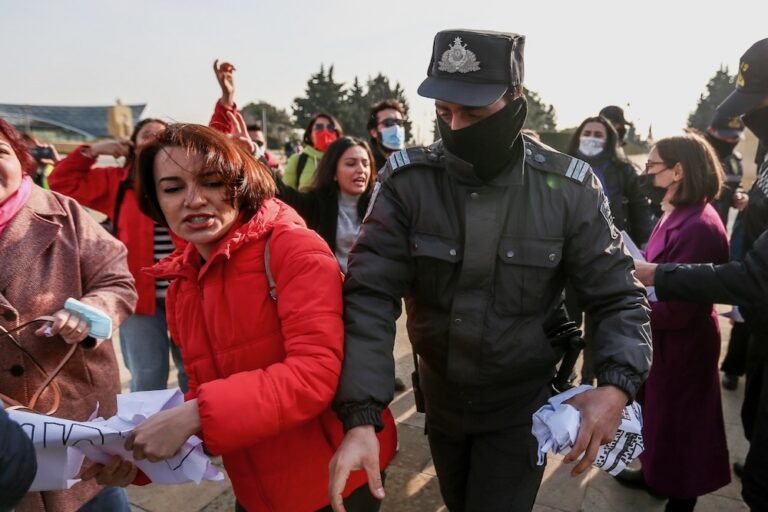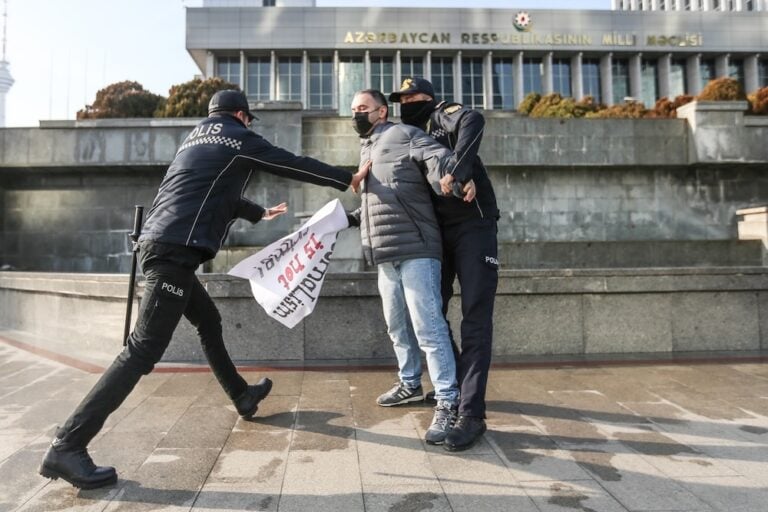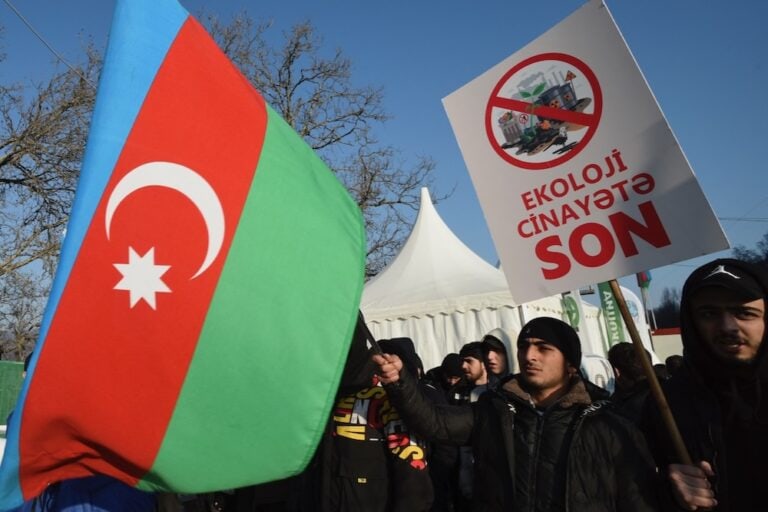The International Partnership Group for Azerbaijan conducted a free expression mission during which they collected testimonies of violations.
(ARTICLE 19/RSF/IFEX) – September 15, 2010 – The International Partnership Group for Azerbaijan conducted a three-day freedom of expression mission to Azerbaijan from 7-9 September, during which they met with journalists and other media workers, civil society activists, and government officials, and collected testimonies of violations of freedom of expression.
The participating organisations were: ARTICLE 19, Freedom House, Index on Censorship, International Federation of Journalists, Media Diversity Institute, Open Society Foundations, Press Now, Reporters Without Borders and World Association of Newspaper and News Publishers.
PRELIMINARY FINDINGS
In Azerbaijan, journalists, bloggers and activists face serious and widespread systemic challenges and are forced to carry out their work in a climate of endemic impunity and under persistent pressure from the authorities. These factors have led to a climate in which self-censorship features prominently. As a result, the past few years have seen a dramatic deterioration in freedom of expression in the country and there are signs that these conditions could worsen in the run-up to the November 2010 parliamentary elections.
Impunity
The murder of journalist Elmar Huseynov in 2005 is symbolic of both the cycle of violence and the broader decline in free expression in Azerbaijan. The persistent targeting of selected individuals in the years following Huseynov’s murder has confirmed that those who attack or harass journalists do so in the knowledge that they will not be punished for their crimes. The continued detention of bloggers Emin Milli and Adnan Hajizade highlights the perversity of a system that does not value the rights of its journalists and the general population. The two bloggers were assaulted, but when they tried to complain to police about the attack, they were arrested.
State influence on the media
State influence and dominance of the broadcast media stifles diversity, creating a media landscape in which pluralism has no place. This is also evident in the print media, which has deteriorated over the last few years. The number of independent media outlets has shrunk since the 2005 parliamentary elections. In 2009, the authorities banned foreign broadcasters from using national frequencies, further limiting the people’s access to a wide range of perspectives.
Economic constraints
The mission is concerned with the pressure exercised and influenced by the state on the distribution, printing, and advertising in the print, broadcast and online media industries.
Abuse of existing laws
The mission is seriously concerned over the abuse of existing laws, which have been used to penalise critical voices. Charges against journalists and bloggers who have expressed critical views include drug possession, inciting hatred, hooliganism, supporting terrorism and tax evasion. The use of such charges is widely considered to be a tactic employed by the authorities to deflect criticism. Such abuse of the law has been made worse in the case of Eynulla Fatullayev, as the authorities continue to refuse to release him from prison in compliance with the April 2010 ruling of the European Court of Human Rights.
Defamation
The mission is encouraged to note that a movement appears to be underway towards removing criminal defamation from the country’s law books. However, there are concerns that the high cost of fines from civil defamation lawsuits poses a serious threat to freedom of expression. The mission also condemns the special privileges enjoyed by public officials.
Divisions within the media profession
The mission notes a marked division within the media itself; members of the sector do not enjoy the level of solidarity found in a healthy and functioning media landscape. These divisions were observed throughout the media sector, including between the capital and the regions, and have led to significant vacuums in the media environment, specifically regarding continuing development of the media, professional standards, self-regulation and protection.
Working conditions for journalists
The vast majority of journalists are forced to work without contracts and on irregular salaries and illegal undeclared payments. They have no employment security and can be hired and fired at will. Journalists also lack the necessary training, independence and ethical guidelines to be able to respect professional and ethical journalism. The situation is exacerbated by the lack of basic employment rights which removes any opportunity for creating a professional space for independent and ethical journalism.
Expression online
There was encouraging evidence of a vibrant and growing online media, including Internet TV. Those using digital media to report, campaign and inform displayed an optimism that bodes well for the future. While the mission is impressed with this enthusiasm and energy, we are aware that this phenomenon is very much limited to the capital, in part due to the cost of Internet access in the country. In spite of its economic strength, the government has failed to provide its citizens with affordable, high speed Internet access.
Click here to read the recommendations from the mission
Media Diversity Institute
Open Society Institute Azerbaijan
Press Now


